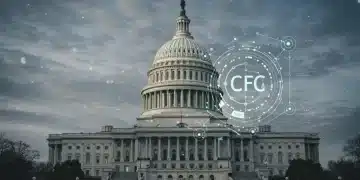Navigating DeFi Regulations: US Investors’ Guide for 2025

Navigating DeFi Regulations: What US Investors Need to Know in 2025 involves understanding emerging regulatory frameworks, compliance requirements, and the potential impact on decentralized finance investments, thereby ensuring informed decision-making in this rapidly evolving landscape.
Understanding the evolving regulatory landscape is crucial for US investors venturing into Decentralized Finance (DeFi). Navigating DeFi Regulations: What US Investors Need to Know in 2025 requires a proactive approach, staying informed about potential compliance requirements and their impact on investment strategies.
Understanding the Emerging DeFi Regulatory Landscape
The decentralized finance (DeFi) sector has witnessed tremendous growth, attracting considerable attention from US investors. However, this growth has also prompted regulatory scrutiny, as authorities grapple with the challenges of overseeing a space characterized by decentralization and innovation. Understanding this evolving landscape is critical for anyone looking to invest in DeFi.
The SEC and DeFi Regulation
The Securities and Exchange Commission (SEC) has taken an active interest in DeFi, focusing on whether certain DeFi products meet the definition of securities. This classification can trigger significant compliance requirements.
CFTC’s Role in DeFi Oversight
The Commodity Futures Trading Commission (CFTC) also plays a role, particularly concerning DeFi platforms offering derivatives or futures contracts. Their oversight aims to protect market integrity and prevent manipulation.
- Defining DeFi: Establishing clear definitions of decentralized finance and related terms.
- Security Tokens: Determining whether specific DeFi tokens qualify as securities under SEC regulations.
- Derivatives Markets: Regulating DeFi platforms that resemble traditional derivatives exchanges.
The initial stages of regulation are focused on solidifying definitions and understanding the underlying technologies. Expect increased clarity in the coming years regarding which DeFi activities fall under existing regulatory frameworks.

Key Regulatory Challenges in DeFi for US Investors
While DeFi offers innovative financial opportunities, it also presents unique regulatory challenges. These challenges stem from the decentralized nature of the technology, the potential for anonymity, and the cross-border nature of many DeFi protocols. US investors need to be aware of these key challenges to make informed decisions.
Anonymity and KYC Compliance
Many DeFi platforms offer a degree of anonymity, which can be at odds with Know Your Customer (KYC) and Anti-Money Laundering (AML) regulations. Balancing privacy with compliance is a significant hurdle.
Cross-Border Regulation
DeFi protocols often operate across multiple jurisdictions, making it difficult to determine which regulatory framework applies. This uncertainty can create compliance risks for US investors.
Smart Contract Risks
Despite their benefits, smart contracts can have vulnerabilities that may lead to unintended consequences and regulatory issues. Security audits and robust testing are crucial.
Addressing these challenges requires ongoing dialogue between regulators, industry participants, and technology experts. US investors should prioritize platforms that demonstrate a commitment to regulatory compliance and transparency.
The Impact of Regulations on DeFi Investment Strategies
As regulations surrounding DeFi become clearer, they will inevitably impact investment strategies. US investors will need to adapt their approaches to ensure compliance while still capitalizing on the opportunities this emerging sector offers.
Compliance Costs and Reporting Requirements
Increased regulation may lead to higher compliance costs for DeFi platforms, potentially impacting returns for investors. New reporting requirements may also be introduced.
Innovation and Development
While regulations can provide stability and investor protection, overly strict rules could stifle innovation and hinder the development of new DeFi products and services.
- Diversification: Spreading investments across various DeFi assets to mitigate risks.
- Due Diligence: Thoroughly researching DeFi platforms and protocols before investing.
- Regulatory Awareness: Staying informed about emerging regulatory developments and their potential impact.
The key impact will be felt in the form of more stringent requirements for DeFi platforms, leading to a more professionalized ecosystem. This, in turn, can attract institutional investors and further mainstream adoption.
Preparing for DeFi Regulations in 2025: A Practical Guide
With the anticipation of more defined DeFi regulations in 2025, US investors should take proactive steps to prepare. This includes understanding their obligations, implementing risk management strategies, and seeking professional advice.
Due Diligence on DeFi Platforms
Conduct thorough due diligence on DeFi platforms before investing, assessing their security measures, compliance policies, and potential regulatory risks.
Consulting Legal and Tax Professionals
Seek advice from legal and tax professionals who specialize in digital assets and DeFi. They can help navigate complex regulatory requirements and optimize tax strategies.
Staying Updated on Regulatory Developments
Regularly monitor regulatory announcements, industry reports, and legal analyses to stay informed about the latest developments in DeFi regulation. Consider following industry associations and thought leaders.

How US Regulations Could Shape the Future of DeFi
US regulations have the potential to significantly shape the future of DeFi. A well-balanced regulatory approach can foster innovation while protecting investors and maintaining market integrity. Conversely, overly restrictive regulations could drive DeFi activity offshore.
Promoting Adoption
Clear and consistent regulations can provide the legal certainty needed to attract institutional investors and drive mainstream adoption of DeFi in the US.
Fostering Innovation
A regulatory sandbox approach can allow innovative DeFi projects to experiment and develop under regulatory supervision, promoting responsible innovation.
Ensuring Investor Protection
Robust regulations that address risks such as fraud, market manipulation, and smart contract vulnerabilities are essential to protect US investors.
The future landscape will likely involve a blend of traditional finance principles and novel approaches tailored to the unique characteristics of DeFi technologies. The US has an opportunity to become a leader in responsible DeFi innovation.
Resources for US Investors to Stay Informed About DeFi Regulations
Staying informed about DeFi regulations requires continuous learning and access to reliable resources. US investors can leverage a variety of sources to keep abreast of the latest developments.
Regulatory Agency Websites
The SEC and CFTC websites provide valuable information about their regulatory priorities, enforcement actions, and educational resources for investors.
Industry Associations and Think Tanks
Organizations focused on blockchain and digital assets often publish reports, host webinars, and advocate for responsible regulation of DeFi.
Legal and Compliance Experts
Engaging with legal and compliance experts specializing in DeFi can provide personalized guidance and insights on navigating regulatory requirements.
Staying informed is an ongoing process; the DeFi regulatory environment is likely to evolve rapidly in the coming years. Make use of available resources to navigate the complexities and ensure compliance.
| Key Point | Brief Description |
|---|---|
| ⚖️ Regulatory Scrutiny | SEC and CFTC are actively monitoring DeFi activities. |
| 🛡️ Anonymity Risks | Balancing anonymity with KYC/AML compliance remains a challenge. |
| 📈 Investment Strategies | Regulations will impact diversification and due diligence approaches. |
| 📚 Staying Informed | Use regulatory websites, industry groups, and experts to stay updated. |
Frequently Asked Questions (FAQ)
The primary regulatory bodies overseeing DeFi in the US are the Securities and Exchange Commission (SEC) and the Commodity Futures Trading Commission (CFTC). They focus on different aspects of DeFi activities.
New regulations could increase compliance costs and reporting requirements for DeFi platforms, potentially impacting investment returns. They might also lead to greater investor protection and market stability.
You can conduct thorough due diligence on DeFi platforms, consult with legal and tax professionals experienced in digital assets, and stay informed about regulatory developments.
A regulatory sandbox allows innovative DeFi projects to experiment and develop under regulatory supervision, promoting responsible innovation while minimizing risks to investors.
You can find information on the SEC and CFTC websites, industry associations, and from legal and compliance experts specializing in digital assets and decentralized finance.
Conclusion
Navigating DeFi Regulations: What US Investors Need to Know in 2025 is a constantly evolving challenge that requires continuous learning, adaptability, and a commitment to due diligence. By staying informed and proactive, US investors can navigate the regulatory landscape successfully and capitalize on the opportunities in the DeFi sector.





